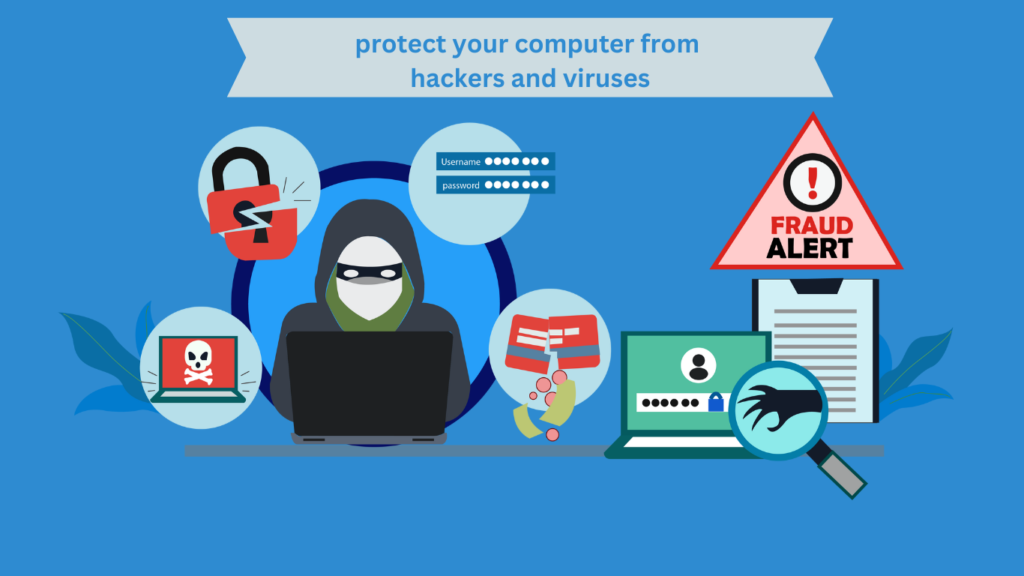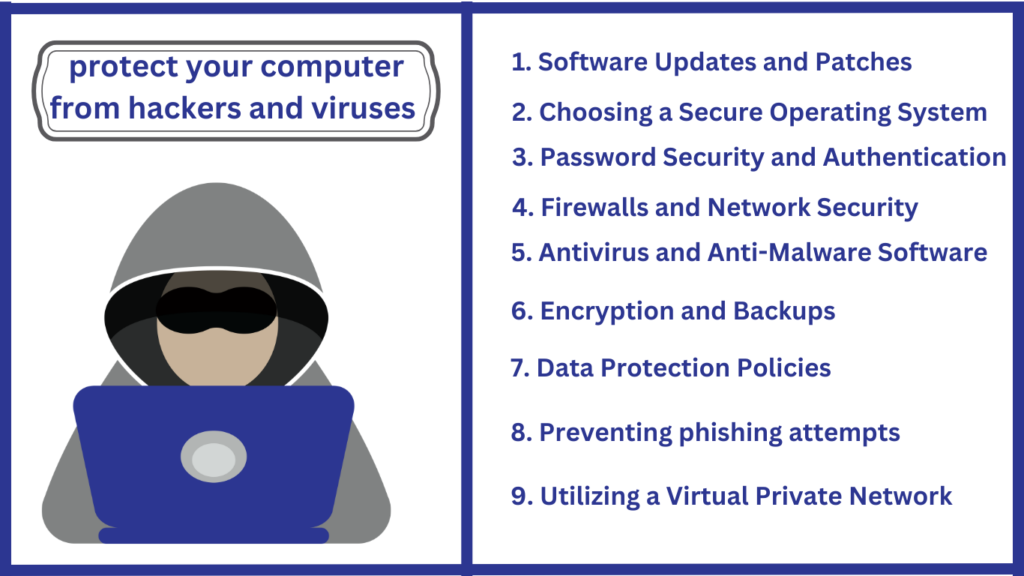Hey! Do you want to know “How to protect your computer from hackers and viruses | what technology can prevent a hacker from using your computer”, then follow this article.

In today’s digital world, it has become increasingly important to protect your computer from hackers and viruses. Every day, malicious actors are looking for new ways to access your data, steal your information, or even take control of your computer.
Fortunately, there are many steps that you can take to secure your system and keep your information safe. This guide will provide you with a comprehensive overview of the best practices for protecting your computer from hackers and viruses.
It will cover topics such as choosing a secure operating system, updating software, using antivirus and anti-malware tools, and more. By implementing the measures outlined in this guide, you can rest assured that your computer and data will be safe from malicious actors.
10 ways to protect your computer from hackers
In today’s digital world, it has become increasingly important to protect your computer from hackers and viruses. Every day, malicious actors are looking for new ways to access your data, steal your information, or even take control of your computer.

Fortunately, there are many steps that you can take to secure your system and keep your information safe. This guide will provide you with a comprehensive overview of the best practices for protecting your computer from hackers and viruses.
It will cover topics such as choosing a secure operating system, updating software, using antivirus and anti-malware tools, and more. By implementing the measures outlined in this guide, you can rest assured that your computer and data will be safe from malicious actors.
1. Software Updates and Patches
One of the most important steps to secure your system is to ensure that you have all the necessary software updates and patches installed. This is especially important for operating systems and applications, as these are often targeted by malicious actors.
Companies often release software updates to fix security vulnerabilities in their products, so it is important to stay up-to-date with the latest updates. You should also make sure that you regularly check for updates and install them as soon as they become available.
In addition to installing updates, you should also consider using a patch management system. This will help you keep track of what updates have been installed and when they need to be applied. This can help ensure that your system is always up-to-date and secure.
Finally, it’s also important to keep a log of which updates have been applied and when. This will help you keep track of what updates have been applied and when they need to be reapplied. It will also help you identify any potential security issues.
2. Choosing a Secure Operating System
The operating system you choose is also important for keeping your system secure. Many operating systems come with built-in security features that can help keep your data safe. You should also make sure that you choose an operating system that is regularly updated with the latest security patches.
It’s also important to note that certain operating systems are more secure than others. For example, Linux-based operating systems are generally more secure than Windows-based systems. This is because they are open-source and have fewer vulnerable points than Windows-based systems.
Finally, you should also make sure that you choose an operating system that has a good reputation for security. This means avoiding any operating systems that have been known to have security issues in the past.
3. Password Security and Authentication
Password security is also an important factor in keeping your system secure. You should always use strong passwords for all of your accounts. This means avoiding obvious passwords such as “123456” or “password”. You should also avoid using the same password for multiple accounts.
In addition to using strong passwords, you should also consider enabling two-factor authentication. This is an extra layer of security that requires you to enter a code from a separate device, such as your smartphone, in order to access your account. This helps ensure that even if someone were to gain access to your password, they would still not be able to access your account.
Finally, you should also consider using a password manager. This is a tool that stores all of your passwords in an encrypted database. This will help you keep track of all your passwords and ensure that they are secure.
4. Firewalls and Network Security
Another important step to secure your system is to set up a firewall. A firewall is a network security device that can help protect your system from unauthorized access. It can also help protect your data from being accessed by malicious actors.
You should also make sure that you have the latest security patches for your firewall. This is important because firewalls are often targeted by malicious actors. You should also make sure that you regularly check for updates and install them as soon as they become available.
Finally, you should also consider using a virtual private network (VPN). A VPN will help protect your data from being monitored or accessed by malicious actors. It will also help protect your data from being accessed when you are connected to public Wi-Fi networks.
5. Antivirus and Anti-Malware Software
Using antivirus and anti-malware software is also an important step to secure your system. This software can help protect your system from malicious software, such as viruses and spyware. It can also help detect and remove any malicious software that may have already been installed on your system.
You should also make sure that you have the latest version of the software installed. This is important because malicious actors are constantly looking for new ways to bypass security measures. You should also make sure that you regularly check for updates and install them as soon as they become available.
Finally, you should also consider using a cloud-based antivirus and anti-malware solution. This will help ensure that your system is always up-to-date and secure.
6. Encryption and Backups
Encryption is also an important step to secure your system. Encryption helps ensure that your data is secure and unreadable by anyone who may gain access to it. You should also make sure that you regularly check for updates and install them as soon as they become available.
In addition to encryption, you should also consider making regular backups of your data. This will help ensure that your data is always safe and secure. You should also make sure that you store your backups in a secure location, such as an external hard drive or a cloud storage service.
Finally, you should also consider using a file encryption tool. This will help ensure that any sensitive data is securely stored and unreadable by anyone who may gain access to it.
7. Data Protection Policies
Implementing data protection policies is also an important step to secure your system. These policies will help ensure that your data is stored securely and that only authorized personnel have access to it. It is also important to ensure that your policies are regularly reviewed and updated to ensure that they are up-to-date.
In addition to data protection policies, you should also make sure that you have a good security framework in place. This should include things such as user authentication, access control, and data encryption. This will help ensure that your data is secure and that it stays secure.
Finally, you should also consider using a data loss prevention (DLP) solution. This will help ensure that your data is not lost or stolen. It can also help you identify any potential security issues.
8. Preventing phishing attempts
Another important step to secure your system is to prevent phishing attempts. Phishing is a type of attack where malicious actors attempt to trick users into revealing sensitive information, such as passwords or credit card numbers.
You should always be wary of any emails or links that you receive. This is especially true if they come from unknown sources or if they contain suspicious attachments. You should also make sure that you never enter your password or other sensitive information on unfamiliar websites.
In addition to being wary of suspicious emails or links, you should also consider using a spam filter. This will help ensure that any suspicious emails or links are blocked before they reach your inbox.
9. Utilizing a Virtual Private Network
Finally, you should also consider using a virtual private network (VPN). A VPN is a secure network connection that helps keep your data secure. It will also help protect your data from being monitored or accessed by malicious actors.
Using a VPN is a great way to ensure that your data is secure. It is also a good way to ensure that you remain anonymous online. Many VPNs also offer additional features, such as the ability to bypass geoblocks and access content from different countries.
In conclusion, protecting your system from hackers and viruses is an important step to ensure that your data is secure. By following the steps outlined in this guide, you can ensure that your system is secure and protected from malicious actors.
10. Conclusion : How to protect your computer from hackers and viruses
Securing your system from hackers and viruses is an important part of keeping your data safe. There are many steps that you can take to secure your system, such as updating software, choosing a secure operating system, using a firewall, using antivirus and anti-malware software, and more.
By implementing the measures outlined in this guide, you can rest assured that your computer and data will be safe from malicious actors.
So that’s all about “How to protect your computer from hackers and viruses | what technology can prevent a hacker from using your computer”
